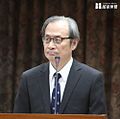Second Su cabinet | |
|---|---|
| 50st premiership of Republic of China (ROC) | |
 | |
| Date formed | 14 January 2019 |
| Date dissolved | 31 January 2023 |
| People and organisations | |
| President | Tsai Ing-wen |
| Head of government | Su Tseng-chang |
| Deputy head of government | Chen Chi-mai Shen Jong-chin |
| Total no. of members | ? |
| Member parties | Democratic Progressive Party (DPP) |
| Status in legislature | DPP majority, pan-green majority |
| Opposition parties | Kuomintang |
| Opposition leader | Johnny Chiang (2020-2021) Eric Chu (since 2021) |
| History | |
| Election | 2016 Taiwanese legislative election |
| Legislature term | Ninth Legislative Yuan |
| Predecessor | Lai cabinet |
| Successor | Chen Chien-jen cabinet [1] |
Su Tseng-chang was appointed to the premiership on 14 January 2019 by President Tsai Ing-wen. He succeeded William Lai, who had resigned in response to the Democratic Progressive Party's poor performance in the 2018 Taiwanese local elections. This is his second tenure of premiership, as he had served as premier under President Chen Shui-bian from 2006 to 2007 with Tsai Ing-wen, the current president, as his deputy. At the age of 71, he is the third oldest individual (after Lee Huan and Chen Chien-jen) to assume the office.
Contents
Su's premiership has led to an increase in approval of the Tsai administration. Recent polls showed an 8.5 percentage point increase in approval of the Tsai administration, with an approval rating of 43 percent. As premier, Su has an approval rating of 53 percent. [2]












































